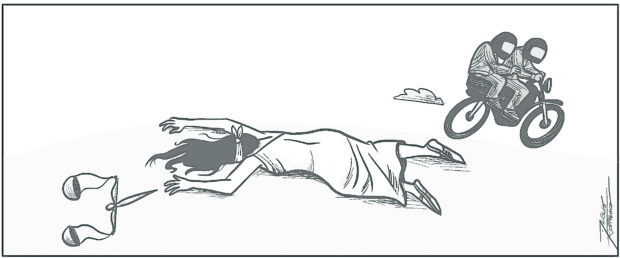
The country’s legal profession was dealt another blow on Sept. 15 when, at around 5 p.m., two motorcycle-riding gunmen fatally shot human rights lawyer Juan G. Macababbad in front of his home in Surallah, South Cotabato. The assassination makes him the 65th lawyer to be killed under the Duterte administration.
The Integrated Bar of the Philippines (IBP) and the National Union of Peoples’ Lawyers (NUPL) condemned the murder of Macababbad as another attack on jurists “who resist tyranny and defend human rights,” and a clear sign of the pervasive “culture of impunity” that has eroded the rule of law in the Philippines. The Union of Peoples’ Lawyers in Mindanao (UPLM) lamented that “The culture of impunity pervades with the lack of serious investigation and prosecution over thousands of extrajudicial killings in the country. The legal profession is not spared, and our colleagues have become main targets.” Macababbad was vice chair of UPLM.
Impunity has been “growing berserk in the country,” said Bayan Muna Rep. Carlos Zarate—and the numbers back up that assertion.
According to the IBP, the number of lawyers killed since President Duterte came into power in 2016 has skyrocketed by 500 percent. Indeed, the number of lawyers and judges killed under the Duterte administration has more than exceeded the total of all prior six administrations, including the 20-year regime of Ferdinand Marcos.
The Supreme Court issued a rare statement in March condemning the relentless attacks on the bench and the bar, which it said were “no less than an assault on the Judiciary.” And “To assault the Judiciary is to shake the very bedrock on which the rule of law stands. This cannot be allowed in a civilized society like ours. This cannot go undenounced on the Court’s watch.”
The court’s denunciation, however, has not put an end to the killings.
Just three weeks before Macabbabad was killed, Cebu-based lawyer Rex Fernandez was ambushed in his car along R. Duterte Street in Barangay Guadalupe, Cebu City. Again, the killers remain free.
The serial liquidation of lawyers has had a chilling effect on members of the profession who dread that they might become the next casualty, said Antonio Azarcon, chair of the UPLM. Lawyers must be able to do their work “without fear of reprisal or violence.” Thus, “We call on the government authorities to do their job in resolving the crime. We also call upon the international community to denounce this and many other attacks against Filipino lawyers as this hampers the practice of the legal profession and makes a mockery of the justice system and the rule of law. Stop the killings! Stop the mere counting! Hold them accountable!”
Alas, that demand scrunches up against the reality of the dismal state of prosecution and justice in the Philippines. Even the judiciary finds itself at the receiving end of that untenable situation. Supreme Court Administrator Midas Marquez told Malacañang’s legislative liason office on Sept. 13 that of the 34 cases of judges murdered while in the service over the past 22 years, only two have been resolved. In 11 cases, no charges have even been filed in court.
The Senate has tried to help address the matter through the creation of the Office of the Judiciary Marshals, which aims to help deter attacks against members of the judiciary and also expedite the investigation of pending cases.
But the office might not get the support and budget it needs to pursue its programs. The Department of Budget and Management cut the judiciary’s budget from P45.31 billion in 2021 to P44.98 billion in the 2022 spending bill submitted to the House of Representatives—a figure far off the P67.27 billion the Supreme Court had sought.
Justice Secretary Menardo Guevarra ordered the National Bureau of Investigation last Monday to investigate and build up the case on Macababbad’s killing. Philippine National Police chief Gen. Guillermo Eleazar also directed the Directorate for Investigation and Detective Management to check on the status of other cases over the past five years where lawyers or judges were killed “to expedite the investigation on those which remain unsolved.”
Yet more statements of resolve, but once again it’s a long waiting game ahead, with Macababbad’s murder likely staying unresolved along with the rest. That inability, or unwillingness, on the government’s part to decisively address the bloodbath stalking the country only further weakens the justice system and brutalizes the citizenry. The killing of public interest lawyers, in particular, leaves defenseless the sectors they serve, such as indigenous peoples, human rights victims, and the poor and marginalized.
With killers and assassins literally getting away with murder, Filipinos, said NUPL president Edre Olalia, would continue “losing the good guys out there while the bad guys are frolicking and plundering all over.”

